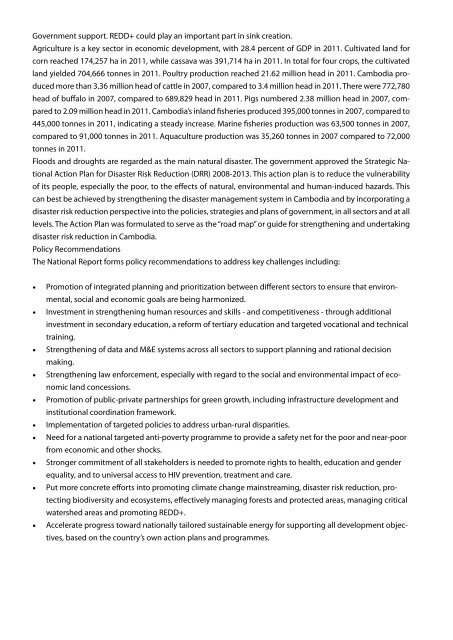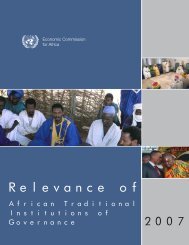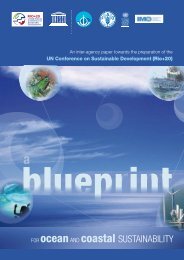National Report - Cambodia - United Nations Sustainable ...
National Report - Cambodia - United Nations Sustainable ...
National Report - Cambodia - United Nations Sustainable ...
You also want an ePaper? Increase the reach of your titles
YUMPU automatically turns print PDFs into web optimized ePapers that Google loves.
Government support. REDD+ could play an important part in sink creation.<br />
Agriculture is a key sector in economic development, with 28.4 percent of GDP in 2011. Cultivated land for<br />
corn reached 174,257 ha in 2011, while cassava was 391,714 ha in 2011. In total for four crops, the cultivated<br />
land yielded 704,666 tonnes in 2011. Poultry production reached 21.62 million head in 2011. <strong>Cambodia</strong> produced<br />
more than 3.36 million head of cattle in 2007, compared to 3.4 million head in 2011. There were 772,780<br />
head of buffalo in 2007, compared to 689,829 head in 2011. Pigs numbered 2.38 million head in 2007, compared<br />
to 2.09 million head in 2011. <strong>Cambodia</strong>’s inland fisheries produced 395,000 tonnes in 2007, compared to<br />
445,000 tonnes in 2011, indicating a steady increase. Marine fisheries production was 63,500 tonnes in 2007,<br />
compared to 91,000 tonnes in 2011. Aquaculture production was 35,260 tonnes in 2007 compared to 72,000<br />
tonnes in 2011.<br />
Floods and droughts are regarded as the main natural disaster. The government approved the Strategic <strong>National</strong><br />
Action Plan for Disaster Risk Reduction (DRR) 2008-2013. This action plan is to reduce the vulnerability<br />
of its people, especially the poor, to the effects of natural, environmental and human-induced hazards. This<br />
can best be achieved by strengthening the disaster management system in <strong>Cambodia</strong> and by incorporating a<br />
disaster risk reduction perspective into the policies, strategies and plans of government, in all sectors and at all<br />
levels. The Action Plan was formulated to serve as the “road map” or guide for strengthening and undertaking<br />
disaster risk reduction in <strong>Cambodia</strong>.<br />
Policy Recommendations<br />
The <strong>National</strong> <strong>Report</strong> forms policy recommendations to address key challenges including:<br />
• Promotion of integrated planning and prioritization between different sectors to ensure that environmental,<br />
social and economic goals are being harmonized.<br />
• Investment in strengthening human resources and skills - and competitiveness - through additional<br />
investment in secondary education, a reform of tertiary education and targeted vocational and technical<br />
training.<br />
• Strengthening of data and M&E systems across all sectors to support planning and rational decision<br />
making.<br />
• Strengthening law enforcement, especially with regard to the social and environmental impact of economic<br />
land concessions.<br />
• Promotion of public-private partnerships for green growth, including infrastructure development and<br />
institutional coordination framework.<br />
• Implementation of targeted policies to address urban-rural disparities.<br />
• Need for a national targeted anti-poverty programme to provide a safety net for the poor and near-poor<br />
from economic and other shocks.<br />
• Stronger commitment of all stakeholders is needed to promote rights to health, education and gender<br />
equality, and to universal access to HIV prevention, treatment and care.<br />
• Put more concrete efforts into promoting climate change mainstreaming, disaster risk reduction, protecting<br />
biodiversity and ecosystems, effectively managing forests and protected areas, managing critical<br />
watershed areas and promoting REDD+.<br />
• Accelerate progress toward nationally tailored sustainable energy for supporting all development objectives,<br />
based on the country’s own action plans and programmes.
















